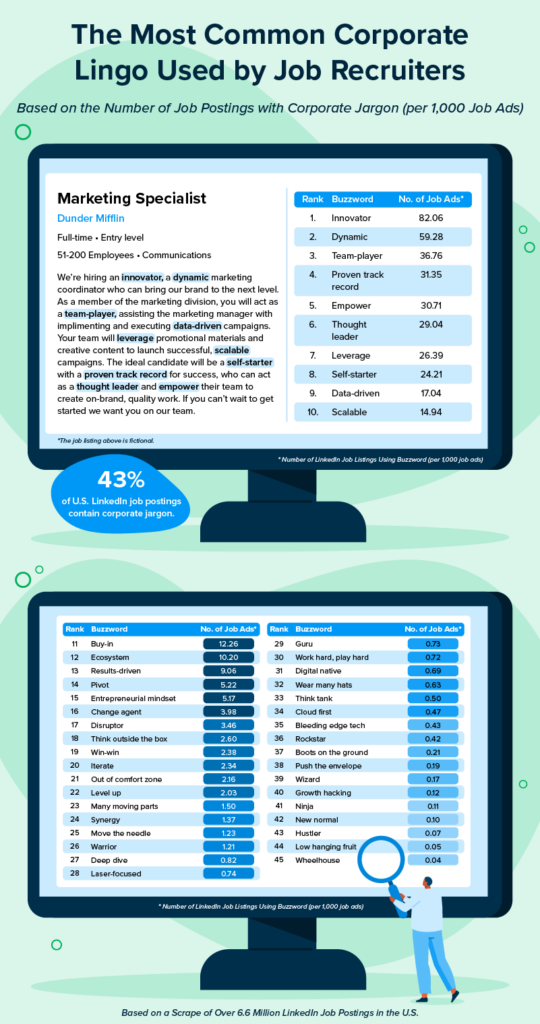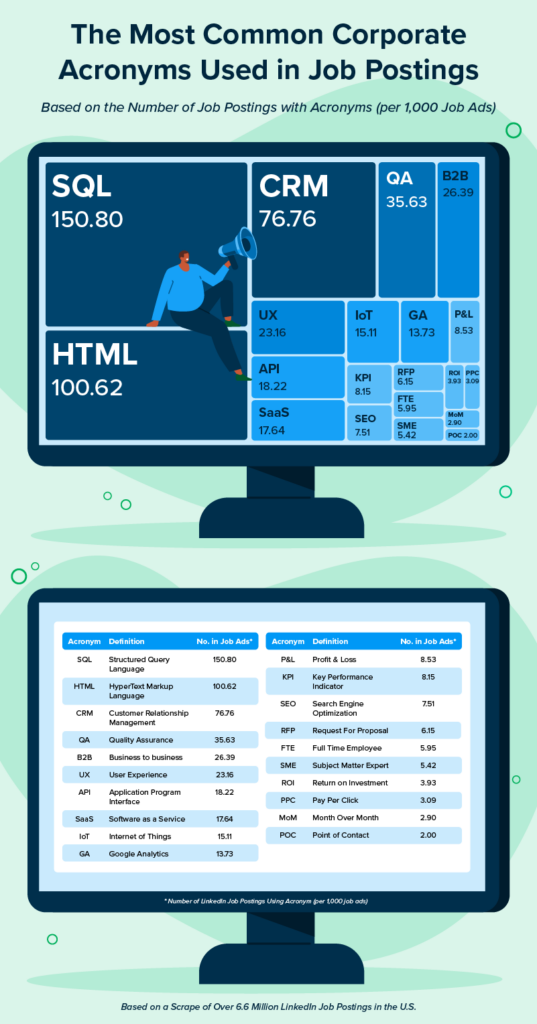The most common corporate lingo used by job recruiters
We scoured over 6 million job listings in the U.S. to determine which stale corporate buzzwords companies use the most during the recruitment process.

We scoured over 6 million job listings in the U.S. to determine which stale corporate buzzwords companies use the most during the recruitment process.

Whether you’re a recruiter for a Fortune 500 company or hunting for your dream job, it’s no secret that job postings can be full of cringe-worthy, eyebrow-raising buzzwords. With job listings looking for digital marketing “ninjas” with a “rock star” attitude, comfortable in “work hard, play hard” environments, you start to feel like you’re trapped in a fever dream of corporate jargon.
Recruiters are resorting to corporate lingo and overused expressions to hook, line, and reel in those with an “entrepreneurial mindset”. Bored yet?
Searching for the right candidate who fits in culturally and professionally can be a tough task to accomplish, which is why the pros at SimpleTexting wanted to take a deep dive into LinkedIn’s job database to determine which buzzwords are used the most in job listings and which states’ recruiters are the biggest culprits. Keep reading to discover the corporate lingo most commonly used in job ads.
We compiled a list of 45 of the most “cringe” corporate buzzwords using lists from Forbes, Inc., and the subreddit “r/recruitinghell”. Next, we scraped the language of over 6.6 million U.S. LinkedIn job postings in November 2022 to find out which of the 45 business buzzwords are being used the most per every 1,000 job ads.
Then, we tallied the number of times these buzzwords were being used in job listings by state and industry, to find the states and industries where job hunters are most likely to be recruited with corporate jargon. Lastly, we replicated this process with corporate acronyms.

Often, corporate jargon in job postings reduces the clarity of job descriptions, confuses job hunters, and may discourage top talent from applying to open positions. We looked at over 6.6 million LinkedIn job postings in the U.S. and found that 43% contain corporate jargon!
The top five corporate buzzwords used in job listings include:
Descriptors like “thought leader,” “change agent,” and “disruptor” landed the top 20 buzzwords used in job postings, along with common workplace clichés like “think outside the box.”

Certain states are looking to lure in potential candidates by splattering their job listings with tons of corporate phrases and Silicon Valley-esque clichés. Climbing the corporate ladder isn’t always easy, but this buzzword list should clue you into what potential recruiters hope to spy on your resume and which states are keeping their eye out the most.
The states where you’ll most likely be recruited with corporate jargon include:
Interestingly, states like Vermont and North Dakota have some of the lowest unemployment rates (as of October 2022), which may mean business buzzwords are working out for them!
On the flip side, Arizona and Indiana are the states using corporate jargon the least. Recruiters in these states only used jargon in 575 and 577 job listings (per 1,000 job ads), respectively. Georgia and Michigan follow as the next states least guilty of leaning on corporate lingo in their job postings.
Certain industries are making headlines for all the wrong reasons, like overusing cringe-y expressions in their LinkedIn job ads. You’re most likely to find corporate lingo in job postings related to the marketing industry, as over 1,027.41 posts (for every 1,000 job ads) contained words like “thought leader,” “leverage,” and “disruptor”.
Other culprits include the finance (946.75 job posts per 1,000 ads) and technology (679.29 job posts per 1,000 ads) sectors.
Getting the lingo right on your resume could be the first step to getting your foot in the door versus a door slammed in your face. While this might be the first step in landing your dream job, bringing a bit of life and personality to your tech resume could also work to your advantage.
On the other hand, sectors like healthcare use less flowery language in their job posts, which makes sense due to the rising demand for workers needed in this industry. This may mean job recruiters are simply cutting to the bone when it comes to job postings, avoiding trite terms and phrases.
Need help on the hiring front? No matter which industry you find yourself in, discover how to attract top talent and learn how to cater your job post to industry-specific trends.

HR professionals can’t seem to get enough of certain acronyms now either, which are making the rounds on job sites like LinkedIn and Indeed. The top three most used acronyms are listed below:
In this rigorous job market, recruiters need to stand out from the competition to attract qualified applicants, in part by writing job postings that use clear, engaging, and genuine language.
Sacrificing substance for “style” in job ads can feel off-putting or even untrustworthy to some jobseekers. In your job postings, opt for a clear, authentic summary of roles and responsibilities targeted to your audience and leave the over-used, corporate lingo behind.
Check out our ultimate text recruiting guide to learn how SMS can help you recruit the best and the brightest. Or, if you’re interested in business texting for your employees, try it for free today.
Dani Henion is the content team lead at SimpleTexting and is continuously looking for ways to make text messaging strategies and tips more accessible to SMBs. When she's not writing or planning new SMS content, you'll find her decorating elaborate sugar cookies or thrifting in Atlanta.
More Posts from Dani HenionIntelyCare has gone from strength to strength, raising an impressive $45 million at the start of this year. As the company expands across America, here’s how it’s using text messages to communicate with its database of nurses.
ReadSharpen your communication skills with text marketing. Learn more about why SMS is an essential tool for recruiters looking to stay agile in the field.
ReadStart a text marketing campaign or have a 1-on-1 conversation today. It's risk free. Sign up for a free 14-day trial today to see SimpleTexting in action.
No credit card required